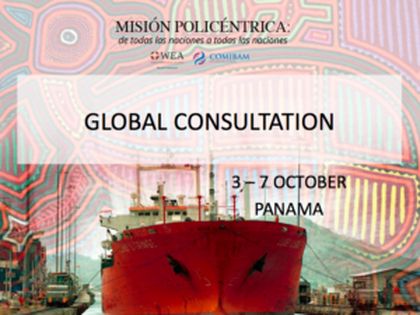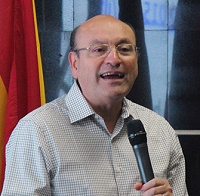“We must be present in the various ‘Areopagus’ of our generation”
The WEA Mission Comission Consultation was held in Panama, with the theme: Polycentric mission. One of the participants, Helder Favarin, shares his views of the gathering with Evangelical Focus.
PANAMA · 21 OCTOBER 2016 · 10:43 CET

The World Evangelical Alliance (WEA) Mission Commission (MC), gathered around 300 people from more than 85 countries in Panama for the Mission Comission Consultation, from October 3-7.
The main theme of the Consultation was Polycentric mission (from all nations to all nations).
It were 5 days for fellowship with one another, a time to share stories, strengthen existing bonds, and build new relationships. Every day began with a time of worship and a biblical reflection based on the book of Jonah.
Several plenary sessions and roundtable discussions were held, along with regional meetings and a mission fair.
Hélder Favarin, founder of the youth movement 180º Global and pastor of a church in Granada (Spain) was one of the participants of the meeting. He told Evangelical Focus: “Interactions were rich and you could learn so much from any participant. There was a clear sense of unity, excitement and openness to learn.”

“The WEA-MC has indeed done an excellent, humble and influential work through the organization of the consultation”, Favarin added.
DAVID RUIZ, NEW MISSION COMISSION DIRECTOR

"I am very grateful for the trust that is given to me as I take on this new role. I believe the Mission Commission is uniquely positioned to provide an understanding of the ever-changing realities in our world today, to raise awareness about new challenges and opportunities for the Church and missions and to unlock the tremendous potential and resources that the Lord provides”, he said.
Read the full interview Evangelical Focus did with Hélder Favarin after the WEA Mission Comission Consultation.
Question. What would you highlight from the Panama meeting?
Answer. First, I'd highlight the profile of the participants. Those who participated at the consultation were invited to do so in light of their involvement, influence and leadership in missions.
Interactions were rich and you could learn so much from any participant. There was a clear sense of unity, excitement and openness to learn. Secondly, I was impressed by the level of the presentations and the quality of the content shared during the consultation; the speakers, including the WEA-MC leadership were not afraid to give thought-provoking addresses, question our global missions status quo and suggest biblical and relevant ways forward as we think and live the reality of polycentric missions (missions from everywhere to everywhere).
The WEA-MC has indeed done an excellent, humble and influential work through the organization of the consultation.

A. Absolutely. All of us, young and old, are called by God himself to cooperate in what he's doing in his world. The youth have been crucial in God's mission from the beginning, according to the Biblical narrative: people like David, Daniel and his friends and so many others in the old testament.
Jesus' disciples were mostly probably on their twenties. See how Paul mentors young men like Timothy and Titus, involving them in his missionary work and giving them huge responsibilities. It's imperative that our youth receives mentoring, encouragement and room to act and lead from the older generation.
I strongly think we need to see the formation of multi-generational leadership in our different circles of influence (churches, ministries, organizations, alliances, etc.). I think what we should embrace is the formation of multi-generational leadership (that is, a leadership that is formed by people from different generations)
Please, I don't want to generalize, but in many evangelical circles, when we have a serious concern for the emerging generations, we tend to create a specific youth department, or commission or area that is focused on reaching them.
That's of course wonderful and necessary. But I want to suggest it's not enough and this might be one of the main reasons why we're not up to the colossal challenge and calling in front of us. - We must go further. Our chore leadership circles (that could be our boards, directive team, councils... whatever body or group of people who are shaping our organizations and churches) should be formed by people from different generations.
Do we see the impressive potential it has? Multi-generational teams are more sensitive to the radical changes in our world, because people from different generations have their fingers on different parts of the pulse of the world, and therefore each feed their perception and wisdom in order to shape the response of the church, project or organization they're a part of. This of course not a new idea. It's the biblical pattern of leadership.
Q. What are the challenges Christians and local churches will face to be missional in such a secularized world?
A. Our world changes so rapidly; in the midst of the new realities that surround us, such as the communication revolution seeing for example in social media or the growth of secularism specially amongst the western youth, Christians have unprecedented opportunities and challenges to live missionally all the time, both locally and globally. We must be present in the various "Areopagus" of our generation (the Areopagus was the place where ideas and world views were considered in Athens, to which Paul was invited to share his teachings on Jesus according to Luke in Acts 17) including universities, social networks, politics, sports and media.
All Christians, not only leaders, must embrace the calling to be salt and light wherever we are, recognizing that we're always on mission. We need to form deep friendships with people around us and understand their questions, pursues and values, if we want to deeply love and influence them.
Surely as Christians we must be at the forefront of bringing freedom, peace, food, health and hope to a broken world through social justice, political engagement, arts and sports. At the same time, it's my impression that we've lost confidence in the verbal proclamation and preaching of the Gospel in many evangelical circles particularly in Europe and North America.
We must be careful and not allow the pendulum to move to another extreme. Churches and ministries that have experienced healthy and special growth in many western secularized contexts have a very high view of proclamation.
God continues to use the mystery of preaching to accomplish what no other task can accomplish, whether among pre-modern, modern or post-modern people. As Lausanne famously expressed: it's about the whole church taking the whole gospel to the whole world.
Published in: Evangelical Focus - world - “We must be present in the various ‘Areopagus’ of our generation”
